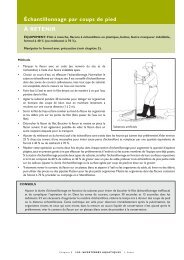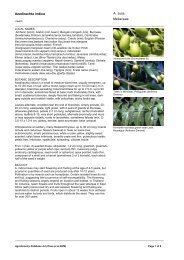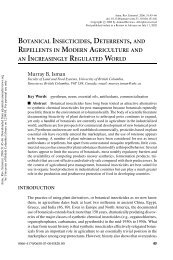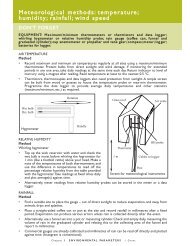- Page 1: International workshop on African W
- Page 4 and 5: The authors and editors are solely
- Page 7: Contents (continued) 18. Traditiona
- Page 10 and 11: Workshop African Water Laws Objecti
- Page 12 and 13: Formal - regulator Water use author
- Page 16 and 17: SHAH In an effort to build upon exi
- Page 18 and 19: SHAH Figure 1. Transformation of in
- Page 20 and 21: SHAH either entailed high transacti
- Page 22 and 23: SHAH Township Electricity Bureau to
- Page 24 and 25: SHAH improving the lot of the farme
- Page 26 and 27: SHAH Much the same is the case with
- Page 28 and 29: SHAH the turn over, the performance
- Page 30 and 31: Outlook of the ‘establishment ’
- Page 32 and 33: SHAH component and a variable compo
- Page 34 and 35: SHAH Fiege, Edger L. 1990. “Defin
- Page 36 and 37: SHAH Wang, J.; Zhang, L. and Cai, S
- Page 38 and 39: SHAH in practice; and ‘there is v
- Page 41 and 42: International workshop on ‘Africa
- Page 43 and 44: JUMA & MAGANGA Interactions between
- Page 45 and 46: JUMA & MAGANGA approval of the dist
- Page 47 and 48: JUMA & MAGANGA Involvement of Water
- Page 49 and 50: Alternatives to formal property rig
- Page 51: JUMA & MAGANGA United Republic of T
- Page 54 and 55: KABUDI The consultants who were cho
- Page 56 and 57: KABUDI For rural water supply, NAWA
- Page 58 and 59: KABUDI Similarly under the provisio
- Page 60 and 61: KABUDI • registration, certificat
- Page 62 and 63: KABUDI Incidents of customary law w
- Page 64 and 65:
KABUDI United Republic of Tanzania,
- Page 66 and 67:
MUMMA water supply development prog
- Page 68 and 69:
MUMMA Decentralization of functions
- Page 70 and 71:
MUMMA resources for domestic purpos
- Page 72 and 73:
MUMMA Land registration, granting p
- Page 74 and 75:
MUMMA donor organization, church gr
- Page 76 and 77:
MUMMA Provisions Act, Chapter 2 of
- Page 79 and 80:
International workshop on ‘Africa
- Page 81 and 82:
DERMAN, HELLUM AND SITHOLE human li
- Page 83 and 84:
DERMAN, HELLUM AND SITHOLE 1964). H
- Page 85 and 86:
DERMAN, HELLUM AND SITHOLE The righ
- Page 87 and 88:
DERMAN, HELLUM AND SITHOLE water fo
- Page 89 and 90:
DERMAN, HELLUM AND SITHOLE Neither
- Page 91 and 92:
DERMAN, HELLUM AND SITHOLE Sithole,
- Page 93:
DERMAN, HELLUM AND SITHOLE Contact
- Page 96 and 97:
CHIKOZHO & LATHAM This programme ha
- Page 98 and 99:
CHIKOZHO & LATHAM • Shona law mak
- Page 100 and 101:
CHIKOZHO & LATHAM scheme that direc
- Page 102 and 103:
CHIKOZHO & LATHAM that they had not
- Page 104 and 105:
CHIKOZHO & LATHAM new SCCs and CCs)
- Page 106 and 107:
CHIKOZHO & LATHAM Government of Zim
- Page 109 and 110:
International workshop on ‘Africa
- Page 111 and 112:
MEINZEN-DICK AND NKONYA The crucial
- Page 113 and 114:
MEINZEN-DICK AND NKONYA cooperate m
- Page 115 and 116:
MEINZEN-DICK AND NKONYA Two very di
- Page 117 and 118:
MEINZEN-DICK AND NKONYA between Pok
- Page 119 and 120:
MEINZEN-DICK AND NKONYA programs to
- Page 121 and 122:
MEINZEN-DICK AND NKONYA Derman, B.
- Page 123 and 124:
International workshop on ‘Africa
- Page 125 and 126:
GARDUÑO • reasonable security of
- Page 127 and 128:
Source: Garduño et al 2002 GARDUÑ
- Page 129 and 130:
GARDUÑO A new water law and regula
- Page 131 and 132:
GARDUÑO systems, user manuals and
- Page 133 and 134:
GARDUÑO may help in obtaining such
- Page 135 and 136:
GARDUÑO for a water rights market
- Page 137 and 138:
GARDUÑO "Implementable" legislatio
- Page 139 and 140:
International workshop on ‘Africa
- Page 141 and 142:
BOELENS & BUSTAMANTE The erosion of
- Page 143 and 144:
BOELENS & BUSTAMANTE tend to involv
- Page 145 and 146:
BOELENS & BUSTAMANTE (Boelens, Roth
- Page 147 and 148:
BOELENS & BUSTAMANTE Box 6. The leg
- Page 149 and 150:
BOELENS & BUSTAMANTE Bauer, Carl. 1
- Page 151:
BOELENS & BUSTAMANTE WALIR. 2002. W
- Page 154 and 155:
BINSWANGER & NGUYEN into their prog
- Page 156 and 157:
BINSWANGER & NGUYEN Developing capa
- Page 158 and 159:
BINSWANGER & NGUYEN disbursement an
- Page 160 and 161:
BINSWANGER & NGUYEN and trainers on
- Page 162 and 163:
BINSWANGER & NGUYEN The community d
- Page 164 and 165:
BINSWANGER & NGUYEN Impact evaluati
- Page 166 and 167:
BINSWANGER & NGUYEN facilitated by
- Page 168 and 169:
BINSWANGER & NGUYEN committee with
- Page 170 and 171:
BINSWANGER & NGUYEN and contribute
- Page 172 and 173:
BINSWANGER & NGUYEN UNCDF. Local De
- Page 174 and 175:
DE REGT billion lacked sanitation s
- Page 176 and 177:
DE REGT Box 1. Community Driven Dev
- Page 178 and 179:
DE REGT approach. One state viz., M
- Page 180 and 181:
DE REGT Over 1000 municipalities ha
- Page 182 and 183:
DE REGT communities, and the domest
- Page 184 and 185:
Notes DE REGT 1 Briscoe, John and D
- Page 186 and 187:
BRUNS Organization of the paper Com
- Page 188 and 189:
BRUNS they do not offer a way to es
- Page 190 and 191:
BRUNS use changes that affect water
- Page 192 and 193:
BRUNS existing regulations and long
- Page 194 and 195:
Concluding conjectures BRUNS Critic
- Page 196 and 197:
BRUNS Fisher, D, W. Ury, and B. Pat
- Page 198 and 199:
BRUNS Wester, Philippus, Douglas J.
- Page 201 and 202:
International workshop on ‘Africa
- Page 203 and 204:
LELO, CHIURI & JENKINS cleared fore
- Page 205 and 206:
LELO, CHIURI & JENKINS Many section
- Page 207 and 208:
LELO, CHIURI & JENKINS • The prod
- Page 209 and 210:
LELO, CHIURI & JENKINS Table 2. Com
- Page 211 and 212:
LELO, CHIURI & JENKINS resource man
- Page 213:
LELO, CHIURI & JENKINS Contact addr
- Page 216 and 217:
Methods SWALLOW, ONYANGO, MEINZEN-D
- Page 218 and 219:
SWALLOW, ONYANGO, MEINZEN-DICK & HO
- Page 220 and 221:
SWALLOW, ONYANGO, MEINZEN-DICK & HO
- Page 222 and 223:
SWALLOW, ONYANGO, MEINZEN-DICK & HO
- Page 224 and 225:
% current population % current popu
- Page 226 and 227:
SWALLOW, ONYANGO, MEINZEN-DICK & HO
- Page 228 and 229:
SWALLOW, ONYANGO, MEINZEN-DICK & HO
- Page 230 and 231:
ONYANGO, SWALLOW AND MEINZEN-DICK w
- Page 232 and 233:
ONYANGO, SWALLOW AND MEINZEN-DICK u
- Page 234 and 235:
ONYANGO, SWALLOW AND MEINZEN-DICK l
- Page 236 and 237:
ONYANGO, SWALLOW AND MEINZEN-DICK F
- Page 238 and 239:
ONYANGO, SWALLOW AND MEINZEN-DICK h
- Page 240 and 241:
ONYANGO, SWALLOW AND MEINZEN-DICK e
- Page 242 and 243:
ONYANGO, SWALLOW AND MEINZEN-DICK T
- Page 244 and 245:
ONYANGO, SWALLOW AND MEINZEN-DICK A
- Page 246 and 247:
ROY WITH CROW & SWALLOW Two main wa
- Page 248 and 249:
ROY WITH CROW & SWALLOW Table 1. Wo
- Page 250 and 251:
ROY WITH CROW & SWALLOW Even though
- Page 252 and 253:
ROY WITH CROW & SWALLOW These fees
- Page 254 and 255:
ROY WITH CROW & SWALLOW acknowledge
- Page 257 and 258:
International workshop on ‘Africa
- Page 259 and 260:
MALZBENDER, GOLDIN, TURTON & EARLE
- Page 261 and 262:
MALZBENDER, GOLDIN, TURTON & EARLE
- Page 263 and 264:
MALZBENDER, GOLDIN, TURTON & EARLE
- Page 265 and 266:
MALZBENDER, GOLDIN, TURTON & EARLE
- Page 267 and 268:
MALZBENDER, GOLDIN, TURTON & EARLE
- Page 269:
MALZBENDER, GOLDIN, TURTON & EARLE
- Page 272 and 273:
PEGRAM & BOFILATOS This paper explo
- Page 274 and 275:
Composition of the Governing Board
- Page 276 and 277:
PEGRAM & BOFILATOS an understanding
- Page 278 and 279:
PEGRAM & BOFILATOS Acknowledgments
- Page 280 and 281:
ANDERSON A.J. The first CMA in Sout
- Page 282 and 283:
ANDERSON A.J. the CMA. Brown and Wo
- Page 284 and 285:
ANDERSON A.J. (Forester, 1989). Thi
- Page 286 and 287:
ANDERSON A.J. Africa. M.Sc. thesis.
- Page 289 and 290:
International workshop on ‘Africa
- Page 291 and 292:
POLLARD & DU TOIT for all, for ever
- Page 293 and 294:
POLLARD & DU TOIT Mismatch between
- Page 295 and 296:
Integrated water resource managemen
- Page 297 and 298:
POLLARD & DU TOIT In many aspects i
- Page 299 and 300:
International workshop on ‘Africa
- Page 301 and 302:
MANZUNGU & MACHIRIDZA white settler
- Page 303 and 304:
MANZUNGU & MACHIRIDZA ‘if a farme
- Page 305 and 306:
MANZUNGU & MACHIRIDZA were consider
- Page 307 and 308:
Post-colonial era MANZUNGU & MACHIR
- Page 309 and 310:
MANZUNGU & MACHIRIDZA Meanwhile som
- Page 311 and 312:
MANZUNGU & MACHIRIDZA Due to long s
- Page 313 and 314:
MANZUNGU & MACHIRIDZA What is impor
- Page 315:
MANZUNGU & MACHIRIDZA Pearce, G. P.
- Page 318 and 319:
Spate irrigation MEHARI, VAN STEENB
- Page 320 and 321:
MEHARI, VAN STEENBERGEN & SCHULTZ B
- Page 322 and 323:
MEHARI, VAN STEENBERGEN & SCHULTZ p
- Page 324 and 325:
MEHARI, VAN STEENBERGEN & SCHULTZ T
- Page 326 and 327:
MEHARI, VAN STEENBERGEN & SCHULTZ T
- Page 328 and 329:
MEHARI, VAN STEENBERGEN & SCHULTZ B
- Page 330 and 331:
Conclusions MEHARI, VAN STEENBERGEN
- Page 333 and 334:
International workshop on ‘Africa
- Page 335 and 336:
FERGUSON & MULWAFU Our research foc
- Page 337 and 338:
FERGUSON & MULWAFU Differences also
- Page 339 and 340:
FERGUSON & MULWAFU inheritance, and
- Page 341 and 342:
FERGUSON & MULWAFU A week later the
- Page 343 and 344:
FERGUSON & MULWAFU the Likangala SM
- Page 345 and 346:
FERGUSON & MULWAFU Food and Agricul
- Page 347 and 348:
International workshop on ‘Africa
- Page 349 and 350:
LANKFORD & MWARUVANDA agreements mi
- Page 351 and 352:
LANKFORD & MWARUVANDA When applied
- Page 353 and 354:
LANKFORD & MWARUVANDA do not correl
- Page 355 and 356:
RIVER SUPPLY River flow supply in d
- Page 357 and 358:
Dekad LANKFORD & MWARUVANDA River E
- Page 359 and 360:
LANKFORD & MWARUVANDA Setting thres
- Page 361 and 362:
LANKFORD & MWARUVANDA Hazelwood, A.
- Page 363 and 364:
International workshop on ‘Africa
- Page 365 and 366:
LAUTZE, GIORDANO & BORGHESE Table 1
- Page 367 and 368:
LAUTZE, GIORDANO & BORGHESE The int
- Page 369 and 370:
LAUTZE, GIORDANO & BORGHESE creatio
- Page 371 and 372:
LAUTZE, GIORDANO & BORGHESE basin
- Page 373 and 374:
LAUTZE, GIORDANO & BORGHESE policy-
- Page 375:
LAUTZE, GIORDANO & BORGHESE World C
- Page 378 and 379:
OPOKU-AGYEMANG As pertains to tradi
- Page 380 and 381:
OPOKU-AGYEMANG The Water Use Regula
- Page 382 and 383:
OPOKU-AGYEMANG (vi) that the princi
- Page 385 and 386:
International workshop on ‘Africa
- Page 387 and 388:
SOKILE, MWARUVANDA, AND VAN KOPPEN
- Page 389 and 390:
SOKILE, MWARUVANDA, AND VAN KOPPEN
- Page 391 and 392:
SOKILE, MWARUVANDA, AND VAN KOPPEN
- Page 393 and 394:
SOKILE, MWARUVANDA, AND VAN KOPPEN
- Page 395 and 396:
SOKILE, MWARUVANDA, AND VAN KOPPEN
- Page 397:
SOKILE, MWARUVANDA, AND VAN KOPPEN
- Page 400 and 401:
EDOSSA, BABEL, GUPTA AND AWULACHEW
- Page 402 and 403:
EDOSSA, BABEL, GUPTA AND AWULACHEW
- Page 404 and 405:
EDOSSA, BABEL, GUPTA AND AWULACHEW
- Page 406 and 407:
EDOSSA, BABEL, GUPTA AND AWULACHEW
- Page 408 and 409:
EDOSSA, BABEL, GUPTA AND AWULACHEW
- Page 410 and 411:
EDOSSA, BABEL, GUPTA AND AWULACHEW
- Page 413 and 414:
International workshop on ‘Africa
- Page 415 and 416:
CHILESHE, TROTTIER & WILSON The own
- Page 417 and 418:
Use Users Proximate source Other Sp
- Page 419 and 420:
CHILESHE, TROTTIER & WILSON transla
- Page 421 and 422:
CHILESHE, TROTTIER & WILSON human r
- Page 423 and 424:
CHILESHE, TROTTIER & WILSON for exa
- Page 425 and 426:
International workshop on ‘Africa
- Page 427 and 428:
KAMBEWA wetland cultivation is thei
- Page 429 and 430:
KAMBEWA Mozambique. People migrated
- Page 431 and 432:
KAMBEWA Ownership and freedom of us
- Page 433 and 434:
KAMBEWA example, with iron roofs) i
- Page 435 and 436:
KAMBEWA However, on a positive note
- Page 437 and 438:
KAMBEWA organized to get water perm
- Page 439 and 440:
International workshop on ‘Africa
- Page 441 and 442:
BURCHI regulations. Recognition, ho
- Page 443 and 444:
BURCHI in theory, be claimed as aga
- Page 445 and 446:
BURCHI limitations as to quantity a
- Page 447:
BURCHI 16 Sarpong 2004, p.8. 17 Law
- Page 450 and 451:
ORINDI&HUGGINS This paper looks at
- Page 452 and 453:
ORINDI&HUGGINS Plains, customary wa
- Page 454 and 455:
ORINDI&HUGGINS decimates the fragil
- Page 456 and 457:
ORINDI&HUGGINS Where registration o
- Page 458 and 459:
ORINDI&HUGGINS farmers cooperative.
- Page 460 and 461:
ORINDI&HUGGINS Systematic land regi
- Page 462 and 463:
ORINDI&HUGGINS population. The grea
- Page 464 and 465:
ORINDI&HUGGINS McGranahan, G and Sa
- Page 468:
This workshop is co-organised by th











